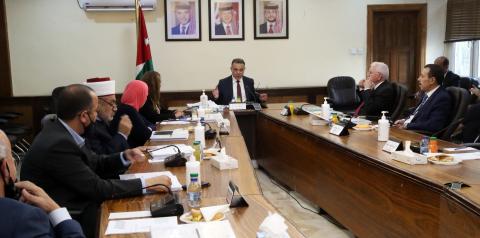

HPC Board of Trustees discussed HPC’s work plan and draft budget of 2020, as well as progress against its strategic plan during a meeting chaired by the Minister of Planning and International Cooperation/ Chairman of the HPC Board of Trustees, Dr. Wisam Al Rabadi, and attended by ministers and representatives of concerned national agencies.
Rabadi stressed the vital role HPC plays in addressing population and development issues and promoting national policies in this field to help create an enabling policy environment to improve the socio-economic conditions of society and advance various sectors.
Rabadi stressed the need to consolidate national efforts to serve population and development issues and support HPC to enable it to implement its projects and programs and achieve its future aspirations that help promote the welfare and prosperity of society and Jordanian citizens.
The Minister of Planning also noted that the covid-19 pandemic has revealed the need to enhance multilateral cooperation across local, regional and international levels, and the need to strengthen global solidarity to face financial, economic and social challenges and other long-term impacts on education, human rights, sustainable development, food safety, migration and migrant issues and labor, and the subsequent consequences on the demographic structures and policies. Dr. Rabadi added that this requires us at the national level to emphasize cooperation among all parties to address global and local challenges facing population policies on different aspects.
Rabadi indicated that success requires close follow up on all related issues following the lead of His Majesty King Abdullah Bin Al Hussein, who follows up on all development issues across the kingdom.
On the other hand, HPC Secretary General, Dr. Abla Amawi, reviewed with the members HPC’s work plan and draft budget of 2020. The meeting also reviewed HPC’s progress against its strategic plan, which seeks to integrate the demographic dimension in national development plans, protect vulnerable groups within the human rights framework, integrate gender and women’s empowerment, respond to forced migrations and asylum, and focus on reproductive health and rights. Amawi explained that the enabling factors that help achieve the above depend on the operational effectiveness and efficiency of HPC in formulating policies, implementing programs, managing resources and results and building partnerships, stressing the need for financial sustainability through contributions from government agencies, the private sector, donors, and civil society to achieve impact and produce and disseminate knowledge.
Amawi overviewed during the meeting HPC’s main achievements and the leading role it played during the Covid-19 pandemic by developing scenarios on projections of infection rates if the social distancing rule is not observed and strict preventative measures are not taken. HPC also conducted studies on Covid-19 impact on different population groups and highlighted the need to provide social protection to these groups, which include, refugees, persons with disabilities, persons suffering with chronic diseases, older persons, economically vulnerable groups, female-headed households, and workers in the informal sector.
Amawi indicated that HPC took part in formulating policies and strategies, including the national reproductive health strategy, updating the national plan for monitoring demographic opportunity policies, approving the national plan for reducing marriages under the age of 18, setting national standards for youth-friendly reproductive health services, localizing sustainable development goals and preparing the executive plan of the national population media strategy. Amawi explained that the 2020 HPC plan is guided by the sustainable development goals, ICPD Programme of Action, Jordan Vision 2025, the Nairobi Summit Global Commitments, and national priorities.
Moreover, Amawi noted that the main challenges facing HPC are the weak integration of the demographic dimension in national and local level planning, failure to achieve the desired targets with respect to women’s economic and political empowerment and protection, weak infrastructure of reproductive health services offered to youth and persons with disabilities, and the difficulty of producing comprehensive and complete data and indicators at the subnational level.
Amawi recommended enhancing national capacities in comprehensive development and population dynamics, optimally capitalizing on displacements and migrations, supporting youth self-employment initiatives and entrepreneurships, ensuring comprehensive and equitable reproductive health service delivery by focusing on adolescents, youth and persons with disability, providing national and subnational comprehensive and complete data and indicators, optimally investing in the demographic opportunity, formulating demographic opportunity-responsive budgets, and enhancing policies that promote women’s economic participation and social protection.
At the institutional level, Amawi explained that HPC prepared reports and studies that serve national priorities, including a report that looks into Covid-19 impact on gender based violence against Syrian refugee women and girls, a policy brief on female students dropout rate and its impact on economic participation and child marriage, the health and psychological impact of Syrian refugee child marriage, research and study priorities in the light of the results of the population and family health survey, media content analysis of population and development issues, as well as local and regional seminars on Covid-19 impact.
With respect to advocacy and awareness, Amawi added that HPC held a meeting of experts to review the priorities and components of a population strategy for Arab countries that can guide countries in aligning population issues with the sustainable development agenda. HPC also conducted surveys and statistics in light of global developments, held youth awareness workshops and trainings to promote the integration of child marriage issues in community-based initiatives (north, central and south regions), held a meeting of experts to discuss youth empowerment and its connection to the sustainable development agenda, proposed projects on the use of social media, arts and theatre to raise awareness of population issues, and took part in technical working groups to update the response plan for the Syrian crisis.







